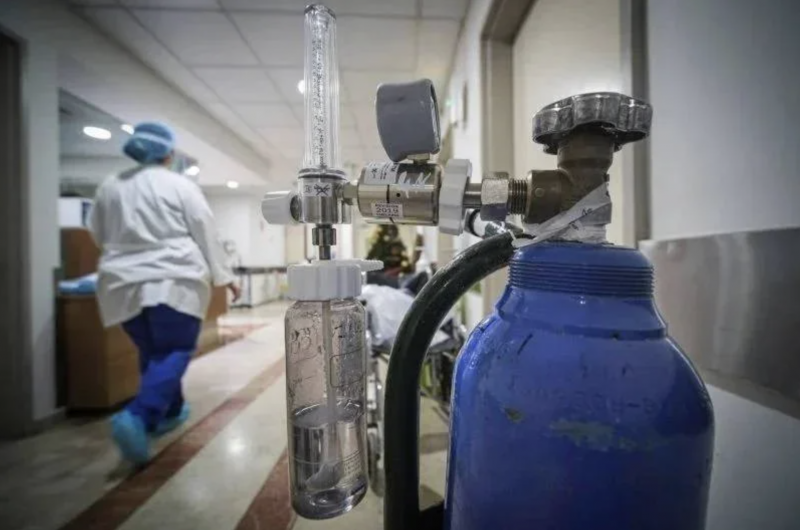
Strengthening the healthcare system to cope with increasingly severe heatwaves has become a necessity. In the photo is a care worker in a Beirut hospital. (Credit: João Sousa)
In coordination with the Hanns Seidel Foundation, the Environment Ministry held a conference on May 20, highlighting the health consequences of the heatwaves that Lebanon and many other countries will face this summer.
These heat waves, increasingly severe and frequent due to climate change, are periods during which temperatures rise above 35°C and pose significant health risks.
According to Lea Kai, a climate change expert with the United Nations Development Program, Lebanon will be 1.6 degrees warmer in 2024 than in 1950, with record drought expected in the Bekaa area.
With the country already approaching these temperatures, L’Orient-Le Jour addresses key points from the conference with Kai.
What are the health consequences of heatwaves?
During the conference, Dr. Tharwat Zahrane, an emergency doctor and toxicologist at AUBMC, explained that cases of respiratory illnesses, infectious diseases [such as typhoid and influenza] and bacterial diseases [including malaria in some countries] increase during these climatic episodes.
The ailments most directly linked to heat are extreme fatigue and heatstroke. Heatstroke is particularly serious, presenting with a body temperature of 42°C or more and neurological symptoms such as behavioral changes or hallucinations. This condition requires immediate hospitalization and rapid treatment.
While waiting for a specialist to intervene, the patient can be immersed in cold water to help decrease the fever.
In addition to health, these changes also have repercussions for the medical sector [increased pressure on hospitals], infrastructure [particularly energy], agriculture [drought], the economy [increased absenteeism] and more.
How many deaths can be attributed to heatwaves?
Heatwave-related deaths are on the rise, although it is still difficult to get exact figures, according to Habib Maalouf, an advisor to the Environment Ministry. This is because there is often a problem with classification, as the reported causes of death may not explicitly include heat as the cause of the illness.
According to figures from the World Health Organization (WHO), the deaths attributable to heatwaves between 1998 and 2017 exceeded 166,000. The WHO study estimated in 2018 that this figure could quadruple between 2018 and 2030, but this projection was reached as early as 2020.
Which institutions are responsible for early warning and rapid response?
The Crisis Management Unit, affiliated with the Prime Minister’s Office, is responsible for identifying risks and issuing directives to relevant ministries and local authorities, who must then take appropriate action.
This unit heavily relies on specific techniques to forecast the risks of climatic events such as floods, heatwaves or major fires. These techniques are used through the National Early Warning System Platform, developed by the National Council for Scientific Research, though often unrecognized by the general public.
Other organizations, including the Civil Defense and the Lebanese Red Cross, are formulating their own emergency response strategies. Experts at the conference emphasized the importance of improved communication among all these entities to significantly enhance disaster mitigation efforts.
Recommendations
The most vulnerable groups, including the elderly, pregnant women and children, require special attention.
In addition to staying hydrated and taking measures to protect themselves from the sun on extremely hot days, experts at the conference emphasized the importance of providing precise weather forecasts with instructions tailored specifically for heatwaves.
They also highlighted the necessity of enhancing the role of operations chambers in the mohafazats [governorates] and municipalities to ensure effective dissemination of information.
Furthermore, there is a pressing need to strengthen hospital infrastructure, particularly in emergency departments, by increasing the number of medical professionals.
Additionally, first-aid centers should be reinforced to better accommodate cases resulting from heatwaves and promptly treat severe symptoms.
In the longer term, we will have to establish more urban gardens to provide residents with cool spaces during hot days. Building design must incorporate considerations for climate change, including sun exposure and insulation.
Rational management of water resources should prioritize natural underground storage to minimize evaporation and pollution risks. Protecting mountain tops and their water sources is essential.
Additionally, efforts to reduce greenhouse gas emissions must be supported as part of a sustainable national strategy.
This article was originally published in L'Orient-Le Jour and translated by Sahar Ghoussoub.
